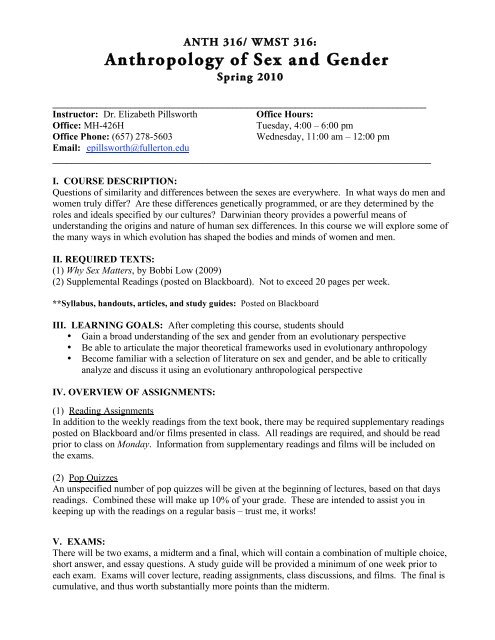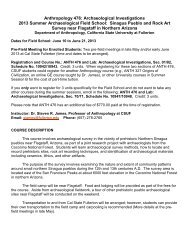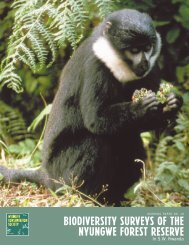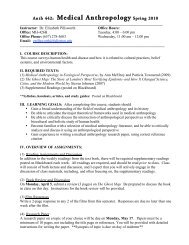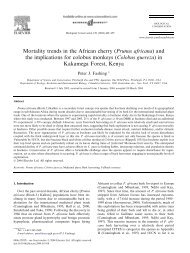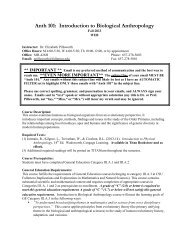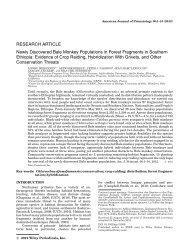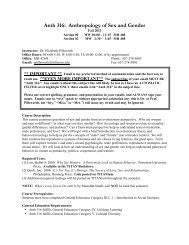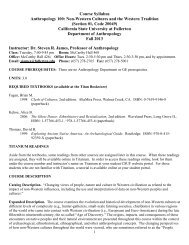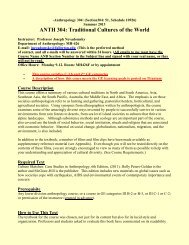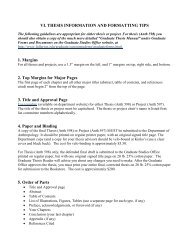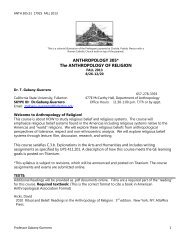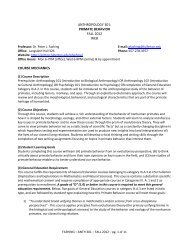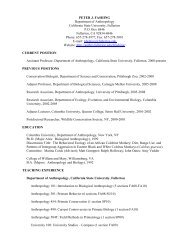Syllabus: Section 1 - CSUF Anthropology - California State ...
Syllabus: Section 1 - CSUF Anthropology - California State ...
Syllabus: Section 1 - CSUF Anthropology - California State ...
You also want an ePaper? Increase the reach of your titles
YUMPU automatically turns print PDFs into web optimized ePapers that Google loves.
ANTH 316/ WMST 316:<br />
<strong>Anthropology</strong> of Sex and Gender<br />
Spring 2010<br />
_____________________________________________________________________________<br />
Instructor: Dr. Elizabeth Pillsworth<br />
Office Hours:<br />
Office: MH-426H<br />
Tuesday, 4:00 – 6:00 pm<br />
Office Phone: (657) 278-5603<br />
Wednesday, 11:00 am – 12:00 pm<br />
Email: epillsworth@fullerton.edu<br />
______________________________________________________________________________<br />
I. COURSE DESCRIPTION:<br />
Questions of similarity and differences between the sexes are everywhere. In what ways do men and<br />
women truly differ? Are these differences genetically programmed, or are they determined by the<br />
roles and ideals specified by our cultures? Darwinian theory provides a powerful means of<br />
understanding the origins and nature of human sex differences. In this course we will explore some of<br />
the many ways in which evolution has shaped the bodies and minds of women and men.<br />
II. REQUIRED TEXTS:<br />
(1) Why Sex Matters, by Bobbi Low (2009)<br />
(2) Supplemental Readings (posted on Blackboard). Not to exceed 20 pages per week.<br />
**<strong>Syllabus</strong>, handouts, articles, and study guides: Posted on Blackboard<br />
III. LEARNING GOALS: After completing this course, students should<br />
• Gain a broad understanding of the sex and gender from an evolutionary perspective<br />
• Be able to articulate the major theoretical frameworks used in evolutionary anthropology<br />
• Become familiar with a selection of literature on sex and gender, and be able to critically<br />
analyze and discuss it using an evolutionary anthropological perspective<br />
IV. OVERVIEW OF ASSIGNMENTS:<br />
(1) Reading Assignments<br />
In addition to the weekly readings from the text book, there may be required supplementary readings<br />
posted on Blackboard and/or films presented in class. All readings are required, and should be read<br />
prior to class on Monday. Information from supplementary readings and films will be included on<br />
the exams.<br />
(2) Pop Quizzes<br />
An unspecified number of pop quizzes will be given at the beginning of lectures, based on that days<br />
readings. Combined these will make up 10% of your grade. These are intended to assist you in<br />
keeping up with the readings on a regular basis – trust me, it works!<br />
V. EXAMS:<br />
There will be two exams, a midterm and a final, which will contain a combination of multiple choice,<br />
short answer, and essay questions. A study guide will be provided a minimum of one week prior to<br />
each exam. Exams will cover lecture, reading assignments, class discussions, and films. The final is<br />
cumulative, and thus worth substantially more points than the midterm.
2<br />
Make-up exam policy: Make-up exams are not automatically given; they may be allowed in certain<br />
circumstances. You are expected to contact me prior to the exam time regarding your illness or other<br />
circumstances. Make-up exams, if allowed, must be taken within one week of the regularly<br />
scheduled exam.<br />
VI. OTHER POLICIES:<br />
Extra Credit: Extra credit opportunities may be provided at my discretion.<br />
Cell Phones: Please turn off anything that makes noise (cell phones, PDAs, etc.) prior to class.<br />
<strong>CSUF</strong> Policy on Academic Dishonesty: Academic dishonesty will not be tolerated. For the full<br />
details of <strong>CSUF</strong> policy on academic dishonesty, see<br />
http://www.fullerton.edu/senate/PDF/300/UPS300-021.pdf<br />
<strong>CSUF</strong> Policy on Disabled Students: The University requires students with disabilities to register<br />
within the first week of classes with the Office of Disabled Student Services (DSS), located in<br />
UH-101 and at (714) 278 – 3112 in order to receive prescribed accommodations and support<br />
services appropriate to their disability. Students requesting accommodations should inform<br />
the instructor during the first week of classes about any disability or special needs that may<br />
require specific arrangements/accommodations related to attending class sessions, completing<br />
course assignments, writing papers or quizzes, tests or examinations. For more information,<br />
see http://www.fullerton.edu/disabledservices/dss_student_Handbook.htm<br />
VII. GE REQUIREMENTS MET:<br />
This course meets the following General Education requirements:<br />
• Lifelong Learning<br />
To accomplish this goal, students would:<br />
1. Further their own critical self-understanding and acquire the knowledge, skills, and attitudes<br />
necessary to engage and reflect in learning and self-development practices.<br />
2. Develop strategies to be integrated physiological, socio-cultural, and psychological beings to<br />
promote a holistic awareness of lifelong learning throughout their lives.<br />
3. Actively apply and participate in developing a lifelong commitment to health for both personal<br />
well being (such as physical, financial, emotional, intellectual, spiritual,<br />
social/interpersonal, and/or environmental aspects) and societal responsibility.<br />
4. Develop themselves as responsible citizens, employees and employers, family members<br />
and members of the global society.<br />
• Cultural Diversity<br />
To accomplish this goal, students would:<br />
1. Demonstrate understanding that culture is socially constructed and fundamental to social<br />
interaction.<br />
2. Demonstrate appreciation of the complex relationships that various factors such as gender,<br />
ethnicity, race, sexual orientation, religion, and class bring to a discussion of society and<br />
culture.<br />
3. Demonstrate understanding that because we live in an inter-connected world, we need to<br />
understand the diversity and relationships within and among cultures.<br />
4. Recognize and evaluate how one’s cultural history affects one’s sense of self and relationship<br />
to others.
VIII. GRADING:<br />
3<br />
Grades are based on % of total points earned<br />
GRADING SCALE:<br />
Quizzes 20 92 – 100 % = A 78 – 79% = C+<br />
Midterm 70<br />
Final 110 90 – 91 % = A- 71 – 77% = C<br />
Total Points Possible 200 88 - 89% = B+ 69 – 70% = C-<br />
82 – 87% = B 60 – 68% = D<br />
80 – 81% = B- Below 59% = F<br />
Schedule<br />
Week 1, Feb 3<br />
Introduction - The basics of evolutionary theory and how it aids us in<br />
understanding similarities and differences between the sexes<br />
Chapters 1 & 2<br />
Week 2, Feb 10<br />
Evolution of the sexes – How differences in reproductive variance have<br />
shaped male and female patterns of mating and parenting effort<br />
Chapter 3<br />
Week 3, Feb 17<br />
Reproductive systems in apes and humans – How ecology shapes<br />
mating systems<br />
Chapter 4<br />
Week 4, Feb 24<br />
Mate choice – What men and women want, and why<br />
Chapter 5<br />
Week 5, Mar 3<br />
Life history theory - Why men and women mature differently, have<br />
different reproductive lifetimes, and age differently<br />
Chapter 6<br />
Week 6, Mar 10<br />
Cross-cultural and Cross-temporal comparisons – Survey of sexual<br />
divisions of labor, control of resources, and gender<br />
Chapter 7
4<br />
Week 7, Mar 17<br />
MIDTERM 4:00 – 5:15 pm<br />
Exam covers Weeks 1-6<br />
Film: TBA<br />
Week 8, Mar 24<br />
The demographic transition – How male and female lifepaths have<br />
changed with economic modernity<br />
Chapter 8<br />
Week 9, Mar 29–Apr 2<br />
Week 10, Apr 7<br />
SPRING BREAK<br />
Cooperation - How male and female sexual strategies can explain<br />
large-scale cooperation in humans<br />
Chapter 9<br />
Week 11, Apr 14<br />
Conflict - Intertwining cultural and natural selection<br />
Chapter 10<br />
Week 12, Apr 21<br />
Coalitions to politics – How reproductive strategies shape male and<br />
female coalitionary psychology<br />
Chapters 11 & 12<br />
Week 13, Apr 28<br />
Sex and war – How sexual selection helped shape early warfare, and<br />
why women warriors are rare<br />
Chapter 13<br />
Week 14, May 5<br />
Sex and war – War and reproductive success today<br />
Chapter 14<br />
Week 15, May 12<br />
The future of sexual strategies – How changes in culture and resources<br />
may be changing female and male strategies<br />
Chapter 15<br />
May 19<br />
FINAL EXAM<br />
5:00 – 6:50 pm
Emergency Procedures Notice to Students<br />
5<br />
The safety of all students attending <strong>California</strong> <strong>State</strong> University Fullerton is of paramount importance.<br />
During an emergency it is necessary for students to have a basic understanding of their personal<br />
responsibilities and the University’s emergency response procedures. In the event of an emergency,<br />
please adhere to the following guidelines.<br />
Before an emergency occurs:<br />
• Know the safe evacuation routes for your specific building and floor.<br />
• Know the evacuation assembly areas for your building.<br />
When an emergency occurs:<br />
• Keep calm and do not run or panic. Your best chance of emerging from an emergency is with a<br />
clear head.<br />
• Evacuation is not always the safest course of action. If directed to evacuate, take all of your<br />
belongings and proceed safely to the nearest evacuation route.<br />
• Do not leave the area. Remember that faculty and other staff members need to be able to account<br />
for your whereabouts.<br />
• Do not re-enter building until informed it is safe by a building marshal or other campus<br />
authority.<br />
• If directed to evacuate the campus, please follow the evacuation routes established by either<br />
parking or police officers.<br />
After an emergency occurs:<br />
• If an emergency disrupts normal campus operations or causes the University to close for a<br />
prolonged period of time (more than three days), students are expected to complete the course<br />
assignments listed on the syllabus as soon as it is reasonably possible to do so.<br />
• Students can determine the University's operational status by checking the University's web site<br />
at http://www.fullerton.edu, calling the University's hotline number at 657-278-4444, or tuning<br />
into area radio and television stations. Students should assume that classes will be held unless<br />
they hear or read an official closure announcement.


